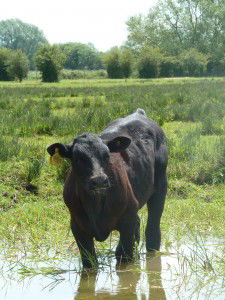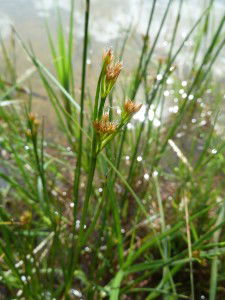Meet the Team: PhD on new ponds
30th July 2015
Cat is studying how well new ponds, created as part of the Million Ponds Project, are doing. The PhD will help us improve our understanding of what makes some new ponds better for wildlife than others
Tell me your name…

Cat Stokowska
And your job title?
I’m a PhD Student. My topic is “Restoring wetland function in human impacted landscapes: what influences the effectiveness of new ponds”.
What does that involve?
It involves a lot of fieldwork. Last year I spent three months in the field. This year it is one month. I take invertebrate samples and draw up a list of all the plants. I also record chemical and physical characteristics, like surrounding land use, nutrient levels, and water depth. I then spend a lot of time in the lab sorting samples and analysing the data. I am getting useful data about new ponds for the Freshwater Habitats Trust.

What’s so important about that?
The point is to see how successful the Million Ponds Project is. Lots of new ponds are being dug, but what do they contribute to freshwater conservation? How are the ponds developing? Are they good for wildlife? I try to understand why some ponds are better for wildlife than others. It’s important to know how new Million Ponds Project ponds are doing, what species there are, whether the water is clean, to inform future pond creation work and improve the information and advice offered in the Pond Creation Toolkit and other work that the Trust does. Aside from the Freshwater Habitat Trust work, people are not really looking at new ponds in a systematic way. There is very little data, and no studies on this scale, and I’m only looking at ponds in Oxfordshire.
What is your favourite part of your job?
Sometimes there are moments in the field – perhaps when I see a dragonfly on a lovely day – special moments that are just so beautiful. And then seeing the data come through, giving a picture of what’s happening, backing up what I see in the field, gives me real satisfaction. It’s also a privilege to spend time with the Freshwater Habitats Trust, people who know so much about ponds. And a practical PhD that won’t just sit on a shelf, but will add real knowledge and inform conservation practices.
And least favourite?
Probably the frustration and uncertainty of research. I need to step back and look at the bigger picture to remind myself why I am doing this as it is easy to get stuck.
Why do you do it? What do you get out of it, and what keeps you going through the hard days?
Stubbornness. I always come back to the fact that it is useful, a real conservation project. When I look at the context, I want to go back to it. I want to complete the challenge of a PhD.
What does freshwater wildlife mean to you?
I can’t go past a pond or river without stopping to take a look. I’m basically doing what I did when I was eight years old. I’ve got a degree, and I haven’t move forward from playing with tadpoles!
What’s your favourite freshwater habitat?
Ponds, of course! Nice ponds. There is one pond in particular, on a nice site I have been working on. It’s part of a proper pond complex, like the Million Ponds Project recommends in Factsheet 4 of the Toolkit. You can see different patches of vegetation, so many different types of plants and habitats. The water is clear, teeming with life.
Rivers are good fun too, if you have a dog.
What got you interested in freshwater habitats?
I fell into a freshwater PhD topic by chance, but I now realise that I’ve always been interested. Since childhood. It was inevitable. Freshwater adds more interest to a landscape. It adds movement. You can’t quite see what’s in there, and that is intriguing. Landscapes are so much more interesting if there is water.
